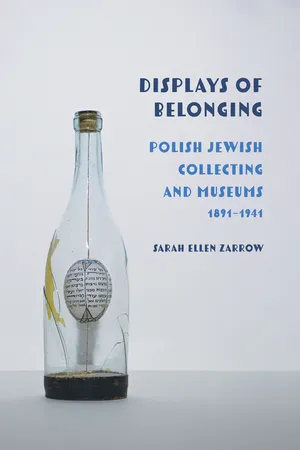
- 294 pages
- English
- ePUB (mobile friendly)
- Available on iOS & Android
About this book
Displays of Belonging illuminates the lives and work of Polish Jewish collectors and museologists, who sought to preserve the treasures of the Jewish past while demonstrating Jewish belonging on Polish soil. As Jews comfortable in the Polish language and within Polish artistic and academic society, they saw themselves as intermediaries between less-integrated Jews and the Polish cultural elite.
At the turn of the century, Jewish ethnographers and museum creators staked their claim to belonging to the civic nation though the display of Jewish folk art, fine art, and Judaica. After the First World War, the nearly three million Jews in the Second Polish Republic were suddenly challenged with finding a place for themselves in a state that increasingly defined itself as a creation of the ethnic Polish nation, to which Jews, by many accounts, did not belong.
By tracing emergent documentation and display practices in partitioned Poland and in the interwar Second Polish Republic, Sarah Ellen Zarrow offers a better understanding of how integrated Jews identified with Polish culture and history and with non-Jewish Poles, and how they conceived of, negotiated, and argued their collective place within Poland. This is not a case of assimilation, nor of acculturation, but rather of displaying a parallel culture that was at once similar and yet distinctive.
Displays of Belonging offers a nuanced understanding of the multiplicity of ways in which Jews in Poland saw their present and dreamed of their future. It places Jewish ethnographic practice and art collection within a Polish context, and sheds light on ways in which ideas about belonging and national identity were negotiated in the space of museums.
Frequently asked questions
- Essential is ideal for learners and professionals who enjoy exploring a wide range of subjects. Access the Essential Library with 800,000+ trusted titles and best-sellers across business, personal growth, and the humanities. Includes unlimited reading time and Standard Read Aloud voice.
- Complete: Perfect for advanced learners and researchers needing full, unrestricted access. Unlock 1.4M+ books across hundreds of subjects, including academic and specialized titles. The Complete Plan also includes advanced features like Premium Read Aloud and Research Assistant.
Please note we cannot support devices running on iOS 13 and Android 7 or earlier. Learn more about using the app.
Information
Table of contents
- List of Illustrations
- Acknowledgments
- A Note on Place Names and Transliteration
- Introduction: Jewish Collectors and the Political Imagination
- 1. Warsaw’s Jews “Discover” the Provinces
- 2. Jewish Museums as Displays of Integration
- 3. The Jewish Museum as Polish and World Museum
- 4. Jewish Museums without Walls
- 5. Museums Open Their Doors Wide
- Conclusion: The Uses (and Abuses) of Jewish Collecting and Display
- Notes
- Bibliography
- Index